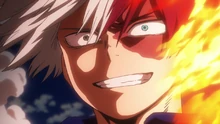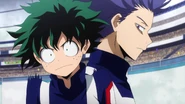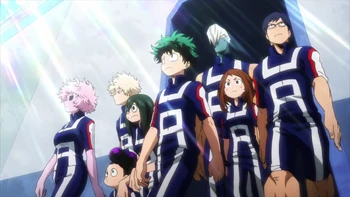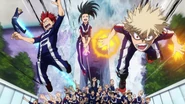My Hero Academia, Season 2 [Episodes 14-26]
 I was originally going to review the entirety of My Hero Academia's second season in one shot, but I kind of thought better of it and, eh, what the fuck, let's just split it into two. The first half of season two is a 12-episode long arc that covers the U.A. Sports Festival Arc, itself taking place over the course of 22 chapters in the manga. And this far more condensed pacing is really, really felt -- I've always felt that the Sports Festival dragged a bit longer than it probably should've had, and some of the less interesting events like the horseback ride or obstacle course, while fun fluff, didn't really needed to have that much screentime in the manga.
I was originally going to review the entirety of My Hero Academia's second season in one shot, but I kind of thought better of it and, eh, what the fuck, let's just split it into two. The first half of season two is a 12-episode long arc that covers the U.A. Sports Festival Arc, itself taking place over the course of 22 chapters in the manga. And this far more condensed pacing is really, really felt -- I've always felt that the Sports Festival dragged a bit longer than it probably should've had, and some of the less interesting events like the horseback ride or obstacle course, while fun fluff, didn't really needed to have that much screentime in the manga.
(Also, the opening and ending themes change after episode 26, so I guess that's as good a cut-off point as any)
And that's basically what I do appreciate about My Hero Academia's seasonal format as opposed to the old-school Shonen Jump anime like One Piece, Dragon Ball Z or Naruto. Instead of exacerbating the pacing problems that already exist in the manga, My Hero Academia's anime actually tries its best to make the story flow in a far more compact and faster pace. A good chunk of the preparations and buildup -- which are scenes that I wouldn't remove, mind you -- are compressed into around an episode and a half, giving the illusion of the characters actually preparing and panicking over this huge school event, while at the same time still not taking up huge chunks of screentime.
Throw in the fact that the anime makes secondary characters a lot more memorable with voice acting and a whole ton more focus, and I genuinely forgot just how prominent some of the 1B class members are in this Sports Festival arc -- something that I actually do have a problem with in the current 1B-centric manga arc running right now. Hell, I basically only really remember Hatsume Mei and Shinsou from this arc's equivalent in the manga! I genuinely forgot the huge amount of focus that Monoma got for being basically a heckler throughout the entirety of the combat round, or his little jackassery against Bakugou in the horse competition tournament that bit him in the ass. I also genuinely forgot that Tokoyami and Kirishima basically became elevated into prominence starting in this arc.
 MHA's detractors tended to note just how the 'school events' and 'random tournaments' are banal arcs that don't progress the main villain plot, but I honestly find that these arcs that really show off how our characters are growing do end up as the heart and soul of the series. Yes, all the fights against Shigaraki or Overhaul or Stain are epic and all, but if the characters themselves aren't given room to grow, I wouldn't really rate MHA as highly as I do.
MHA's detractors tended to note just how the 'school events' and 'random tournaments' are banal arcs that don't progress the main villain plot, but I honestly find that these arcs that really show off how our characters are growing do end up as the heart and soul of the series. Yes, all the fights against Shigaraki or Overhaul or Stain are epic and all, but if the characters themselves aren't given room to grow, I wouldn't really rate MHA as highly as I do.
Of course, the huge character moments that I genuinely remember fondly from this arc involves the general theme of "everyone is trying to be the best". So many other Shonen manga tended to have the side characters just go "oh, well, I'll do my best... to support the main character". Characters like Iida, Todoroki, Bakugou, Uraraka and Shinsou all really show off that they are all aiming for the top, that they all are characters that have their own dreams and aspirations and goals to achieve. It's one of the biggest reasons why I really ended up liking My Hero Academia, really -- it has one of the most nebbish protagonists out there, which works a lot in his favour as he ends up learning to stand up and not back down or yield from the competitiveness out there. It's a genuinely interesting theme to explore, that you can be competitive without yielding any sort of advantages to your friend, while also at the same time not being a treacherous or sabotaging dick.
 Todoroki's storyline is the one explored the most in this arc, I think, being the spotlight for the two big conflicts that end the fighting tournament. His tragic backstory with his abusive father and driven-to-madness mother is told to us here, and it's genuinely interesting how Midoriya ends up "rescuing" Todoroki from just basically burning in absolutes, forcing himself to fight at a handicap out of nothing but spite. Yes, Endeavour is a character that deserves all the spite (eventual character development notwithstanding) but as Bakugou and Midoriya point out in their own respective ways, Todoroki is never going to be any sort of top hero if he insists on handicapping himself on what is essentially personal choices.
Todoroki's storyline is the one explored the most in this arc, I think, being the spotlight for the two big conflicts that end the fighting tournament. His tragic backstory with his abusive father and driven-to-madness mother is told to us here, and it's genuinely interesting how Midoriya ends up "rescuing" Todoroki from just basically burning in absolutes, forcing himself to fight at a handicap out of nothing but spite. Yes, Endeavour is a character that deserves all the spite (eventual character development notwithstanding) but as Bakugou and Midoriya point out in their own respective ways, Todoroki is never going to be any sort of top hero if he insists on handicapping himself on what is essentially personal choices.
I also really do like the fight between Shinsou and Midoriya -- too often these sort of fantasy settings acknowledge that there's some sort of hierarchy between the superpowered people of the world, but don't really touch upon the lower ranks. As someone who aspires to be a hero and help people as much as Midoriya, Todoroki and the others, Shinsou is blessed (cursed?) with a quirk that is basically tailor-made for a villain, and one that's basically useless in the placement test. The fight against him really only lasted for like half an episode, but there's a reason why Shinso is one of the most popular characters from the anime's second season despite his pretty minor role. The fantastic voice acting he's given helps, too.
And probably a somewhat controversial thing is that... I really like the Uraraka/Bakugou fight. And the fact that Bakugou ends up still being as crass and brutal as he always has been, but doesn't seem to be blowing up the girl out of spite. As Eraserhead notes to the booing pro heroes, in a world with superpowers and a class where everyone is expected to be a superhero and fight villains in the future, by telling Bakugou to pull his punches just because Uraraka is a helpless little girl is far bigger of an insult compared to Bakugou, who is genuinely fighting with all his might against Uraraka in the battlefield -- and, even by his own admission, barely winning against a worthy combatant.
 Sure, Uraraka did lose in the end, but I've always thought that this moment, where Eraserhead puts his feet down and basically hammers home real gender equality is probably one of my favourite moments of this show, especially in a genre where a vast majority of female characters tended to be brushed aside as 'support characters'. I don't like to get too much into gender politics, but this has always been a neat little moment in this series for me.
Sure, Uraraka did lose in the end, but I've always thought that this moment, where Eraserhead puts his feet down and basically hammers home real gender equality is probably one of my favourite moments of this show, especially in a genre where a vast majority of female characters tended to be brushed aside as 'support characters'. I don't like to get too much into gender politics, but this has always been a neat little moment in this series for me.
Iida's bit where he rejects teaming up with Midoriya just because he needs to start relying on himself and not just on Midoriya's brains is a neat, small badass moment, although a good chunk of his character arc in this storyline is basically involving his defeat, and the revelation that his idolized brother Ingenium was nearly murdered by the Hero Killer Stain.
And... yeah, Stain's introduction in this arc is kind of m'eh, isn't it? I do appreciate foreshadowing, but it's kind of so vague, trying to introduce Stain and the enigmatic "Sensei" at the same time, as well as Todoroki doing his silly man-child routine... it's not horrible, but it definitely could've been done better.
 Ultimately, this is probably the arc that's going to make or break My Hero Academia for most viewers, I think. The series is going to alternate hard between a huge character-centric school-related arc and a huge plot/action-packed villain-related arc practically every time a story arc happens, and it's honestly why I actually do like the series a fair bit. The UA Sports Festival arc does have its share of weaker moments, admittedly -- the sheer amount of characters, for one -- but I do find that in animated format, the far more distinctive colourful designs and voices make characters like Ojiro, Sero or Ashido stand out far, far more than they do in the manga. The pacing and animation's done pretty damn well, the comedic beats mostly work and the voice acting is pretty top-notch. Best animated fight has to be Bakugou versus Todoroki, and my favourite voice actor for this entire arc is probably Present Mic's godsend of a voice.
Ultimately, this is probably the arc that's going to make or break My Hero Academia for most viewers, I think. The series is going to alternate hard between a huge character-centric school-related arc and a huge plot/action-packed villain-related arc practically every time a story arc happens, and it's honestly why I actually do like the series a fair bit. The UA Sports Festival arc does have its share of weaker moments, admittedly -- the sheer amount of characters, for one -- but I do find that in animated format, the far more distinctive colourful designs and voices make characters like Ojiro, Sero or Ashido stand out far, far more than they do in the manga. The pacing and animation's done pretty damn well, the comedic beats mostly work and the voice acting is pretty top-notch. Best animated fight has to be Bakugou versus Todoroki, and my favourite voice actor for this entire arc is probably Present Mic's godsend of a voice.
No comments:
Post a Comment